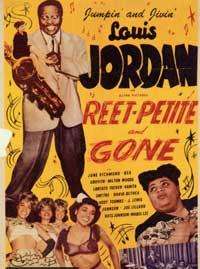Reet, Petite, and Gone
| Reet, Petite, and Gone | |
|---|---|
 | |
| Directed by | William Forest Crouch |
| Produced by |
Berle Adams (executive producer) William Forest Crouch (producer) Robert M. Savini (executive producer) |
| Written by |
William Forrest (story) Irwin Winehouse (writer) |
| Starring | See below |
| Cinematography | Don Malkames |
| Edited by | Leonard Anderson |
| Distributed by | Astor Pictures |
Running time | 67 minutes |
| Country | United States |
| Language | English |
Reet, Petite, and Gone is a 1947 American musical race film directed in his feature film debut by short subject director William Forest Crouch that was produced and released by Astor Pictures. The film stars Louis Jordan and in her credited feature film debut, June Richmond.
Plot summary
Louis Jarvis Jr is called away from his band's radio show to visit his terminally ill father before he dies. Also summoned by Louis Jarvis Sr is Honey Carter, the daughter of the only woman he ever loved. Jarvis Senior's dying wish is that Honey and Louis get together with the elder Jarvis planning his will so that Junior will not inherit his estate until he marries Honey, or a woman like him to bring him happiness and stability. Sadly the elder Jarvis dies before meeting his son and Honey.
Jarvis Senior's shady lawyer Henry Talbot sees a chance to get a portion of the Jarvis estate for himself by rewriting the will to make it sound like Jarvis Junior must marry a woman with the attributes of his secretary Rusty with the plan that Rusty will divorce Jarvis Junior and she and Henry will split the estate. The ruse is undetected with Junior Jarvis having a time limit where if he is not married the estate will go to Henry to distribute to charities.
Junior urgently needs the money to produce his new stage musical. Junior is not keen to marry Rusty, but his friend suggests they cast the show with a lead having the physical attributes of Rusty, however Henry attempts to stop the show by scaring off Junior's investors.
Cast
- Louis Jordan as Schyler Jarvis / Louis Jarvis
- June Richmond as June
- Milton Woods as Sam Adams
- Bea Griffith as Honey Carter / Lovey Linn
- David Bethea as Dolph the butler
- Lorenzo Tucker as Henry Talbot
- Vanita Smythe as Rusty
- Mabel Lee as Mabel
- Dots Johnson as Michaels
- Pat Rainey as Pat Rains
- Rudy Toombs as Hal
- J. Louis Johnson as Schyler Jarvis Sr.
- Joe Lillard as Lt. Jerome
Soundtrack
- Louis Jordan with his Tympany Five - "Texas and Pacific" (by Jack Wolf Fine)
- Louis Jordan with his Tympany Five - "All for the Love of Lil"
- Bea Griffith and Louis Jordan - "Tonight, Be Tender to Me"
- Pat Rainey, Mabel Lee with Louis Jordan and his Tympany Five - "The Blues Ain't Nothin'" (Written by Ida Cox)
- Louis Jordan with his Tympany Five - "The Green Grass Grew all Around" (by William Jerome, arrangement by Louis Jordan)
- June Richmond - "I've Changed Completely"
- Louis Jordan with his Tympany Five - "Wham, Sam! (Dig Them Gams)" (Written by Louis Jordan)
- Louis Jordan with his Tympany Five - "I Know What You're Puttin' Down" (Written by Louis Jordan)
- Louis Jordan with his Tympany Five - "Let The Good Times Roll" (Written by Spo-De-Odee and Fleecie Moore)
- Louis Jordan with his Tympany Five - "Reet, Petite, and Gone" (Written by Louis Jordan)
- June Richmond and Louis Jordan with his Tympany Five - "You Got Me Where You Want Me" (writer info not available)
- Louis Jordan with chorus girls - "That Chick's too Young to Fry" (Written by Tommy Edwards and Jimmy Hilliard)
- Louis Jordan - "Ain't That Just Like a Woman?" (Written by Fleecie Moore and Claude Demetri)
- Louis Jordan with Bea Griffith - "If It's Love You Want, Baby, That's Me" (Written by Sid Robin)
External links
| Wikimedia Commons has media related to Reet, Petite, and Gone. |
- Reet, Petite, and Gone on IMDb
- Reet, Petite, and Gone is available for free download at the Internet Archive